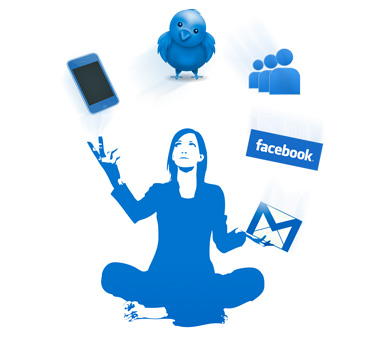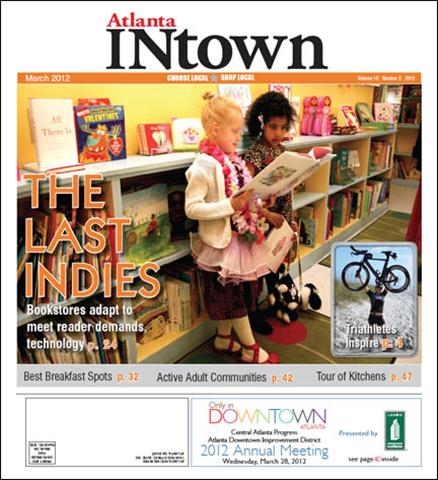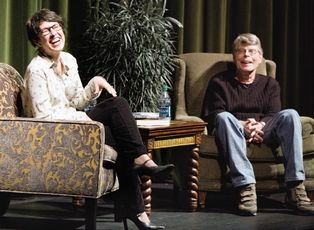E-Book Reading: Tablets Bring New Focus to Distractions
Tablets have led to changes in how people read books, the New York Times reported today.
[Check Times headlines now.] Citing Google, Netflix, Twitter and e-mail that "lurks tantalizingly within reach," the paper said that the lure of other applications "can fragment the reading experience, or stop it in its tracks."
Citing Google, Netflix, Twitter and e-mail that "lurks tantalizingly within reach," the paper said that the lure of other applications "can fragment the reading experience, or stop it in its tracks."
[Check e-mail and Twitter now.]
One Kindle Fire user compared the experience with "trying to cook when there are little children around. A child might do something silly and you've got to stop cooking and fix the problem and then return to cooking."
[Go to epicurious.com.]
A college senior with a Kindle Fire noted that she is finding it difficult to finish books and was able to focus on one title only when she was on a plane with no Internet access.
[Check United.com to see if it's working.]
In part because of the distraction phenomenon, as well as their relatively low cost, dedicated e-reading devices should continue to be popular, although the long-term trend is for multifunctional devices to replace dedicated devices, such as with smartphones combining cameras, GPS and Palm Pilot functions.
[Google Palm Pilot and stylus.]
But some observers say that people who have tablets and aren't big readers may begin to read more e-books. Conversely, heavy readers may plow on despite the distractions. One "voracious reader" with a tablet who has bought more books than ever--and not finished more books than ever--told the Times that she noticed a change in her reading habits: "Recently I gravitate to books that make me forget I have a world of entertainment at my fingertips. If the book's not good enough to do that, I guess my time is better spent."
[Google "age-old attraction of reading."]









 Publisher and author
Publisher and author  A YA novel set in Alaska by an Alaskan author whose "books have always been well received" in the Anchorage Barnes & Noble, as the community relations manager told the Anchorage Daily News, is the unintended victim of the battle between Amazon and other retailers over the e-tail giant's publishing program.
A YA novel set in Alaska by an Alaskan author whose "books have always been well received" in the Anchorage Barnes & Noble, as the community relations manager told the Anchorage Daily News, is the unintended victim of the battle between Amazon and other retailers over the e-tail giant's publishing program. Facebook's recent introduction of its new Timeline profile has proven to be
Facebook's recent introduction of its new Timeline profile has proven to be  "Shop owners say they have had to become experts on the reading habits of their customers and pack their calendars with events designed to draw crowds,"
"Shop owners say they have had to become experts on the reading habits of their customers and pack their calendars with events designed to draw crowds,"  Mendham Books in Mendham has benefited from a range of major author events--125 last year--such as an appearance by New York Jets coach Rex Ryan. "If you want to shake hands with Rex, take a picture and get him to sign your copy, those are some of the things that don't translate to the ethereal world of digital content," said co-owner Tom Williams.
Mendham Books in Mendham has benefited from a range of major author events--125 last year--such as an appearance by New York Jets coach Rex Ryan. "If you want to shake hands with Rex, take a picture and get him to sign your copy, those are some of the things that don't translate to the ethereal world of digital content," said co-owner Tom Williams. Opening in 2004, Sages Pages in Madison moved to large space in 2008, just as the economy--and sales--crashed. The situation has stabilized, but owner Lillian Trujillo struck a pessimistic note. "We're steady now and just make our bills, but even if the economy gets better, the industry is still declining," she said.
Opening in 2004, Sages Pages in Madison moved to large space in 2008, just as the economy--and sales--crashed. The situation has stabilized, but owner Lillian Trujillo struck a pessimistic note. "We're steady now and just make our bills, but even if the economy gets better, the industry is still declining," she said. Despite the closing of Outwrite Bookstore and Coffeehouse earlier this year and impending loss of Blue Elephant Book Shop later this month,
Despite the closing of Outwrite Bookstore and Coffeehouse earlier this year and impending loss of Blue Elephant Book Shop later this month, 
 A 1960 photo of novelist
A 1960 photo of novelist  Stephen King was the star of an event
Stephen King was the star of an event Women with psychic powers take center stage in The Vanishers, a paranormal thriller by Heidi Julavits (The Uses of Enchantment) that turns on rivalry between women and the often fraught relationship between mothers and daughters.
Women with psychic powers take center stage in The Vanishers, a paranormal thriller by Heidi Julavits (The Uses of Enchantment) that turns on rivalry between women and the often fraught relationship between mothers and daughters.